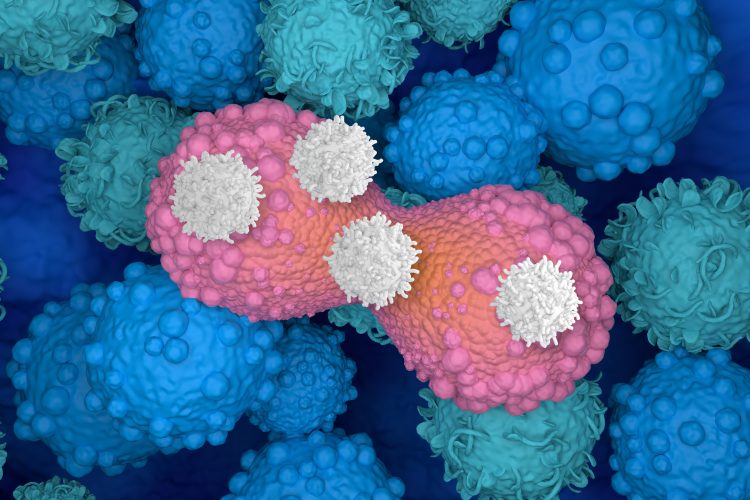COVID-19 and flu could awaken hidden breast cancer cells
Posted: 5 August 2025 | Drug Target Review | No comments yet
Scientists have discovered that infections like COVID-19 and flu can “wake up” dormant breast cancer cells – triggering new tumour growth in the lungs.


Researchers at the University of Colorado Anschutz Medical Campus, Montefiore Einstein Comprehensive Cancer Center (MECCC) and Utrecht University have discovered the first direct evidence that common respiratory disorders can awaken dormant breast cancer cells that have spread to the lungs. The findings, published in Nature, were based on mice studies and supported by data showing increased cancer-related mortality and metastatic lung disease among cancer survivors infected with SARS-CoV-2.
“Our findings indicate that individuals with a history of cancer may benefit from taking precautions against respiratory viruses, such as vaccination when available, and discussing any concerns with their healthcare providers,” said Dr Julio Aguirre-Ghiso, co-leader of the study and director of MECCC’s Cancer Dormancy Institute.
How viruses awaken ‘sleeper cells’
Prior evidence suggested that inflammatory processes might awaken disseminated cancer cells (DCCs) – cells that spread from a primary tumour to distant organs and often lie dormant for years.
Automation now plays a central role in discovery. From self-driving laboratories to real-time bioprocessing
This report explores how data-driven systems improve reproducibility, speed decisions and make scale achievable across research and development.
Inside the report:
- Advance discovery through miniaturised, high-throughput and animal-free systems
- Integrate AI, robotics and analytics to speed decision-making
- Streamline cell therapy and bioprocess QC for scale and compliance
- And more!
This report unlocks perspectives that show how automation is changing the scale and quality of discovery. The result is faster insight, stronger data and better science – access your free copy today
“During the COVID-19 pandemic, anecdotal reports suggested a possible increase in cancer death rates, bolstering the idea that severe inflammation might contribute to arousing dormant DCCs,” said Dr Aguirre-Ghiso.
Using unique mouse models of metastatic breast cancer with dormant DCCs in the lungs, researchers exposed the mice to SARS-CoV-2 and influenza viruses. Both infections triggered the awakening of dormant DCCs – leading to a fast expansion of metastatic cells within days and visible metastatic lesions within two weeks.
“Dormant cancer cells are like the embers left in an abandoned campfire, and respiratory viruses are like a strong wind that reignites the flames,” said senior author and deputy director of CU Cancer Center Dr James DeGregori.
Molecular analysis revealed that interleukin-6 (IL-6) – a protein released by immune cells during infections or injury – was a key driver of this process.
“The identification of IL-6 as a key mediator in arousing DCCs from dormancy suggests that using IL-6 inhibitors or other targeted immunotherapies might prevent or lessen the resurgence of metastasis following viral infection,” said Dr Aguirre-Ghiso.
Human data support the findings
The COVID-19 pandemic allowed researchers to investigate this mechanism in human populations. The team analysed two large datasets and found that respiratory virus infections in cancer survivors were linked with an increased risk of metastasis.
Using the UK Biobank – which follows more than 500,000 participants – researchers examined cancer survivors diagnosed at least five years prior to the pandemic. Among the 487 individuals who tested positive for COVID-19 –compared with 4,350 matched controls who tested negative – those with prior COVID-19 infections were nearly twice as likely to die from cancer. “The effect was most pronounced in the first year after infection,” said Dr Roel Vermeulen.
Similarly, data from the US Flatiron Health database showed that female breast cancer patients who contracted COVID-19 were almost 50 percent more likely to experience lung metastases compared to those who were COVID-19 negative.
“Our findings suggest that cancer survivors may be at increased risk of metastatic relapse after common respiratory viral infections,” said Dr Vermeulen. “It is important to note that our study focused on the period before COVID-19 vaccines were available.”
Looking ahead
The researchers emphasise the need for further study. “By understanding underlying mechanisms, we will work hard to develop interventions that can limit the risk of metastatic progression in cancer survivors who experience respiratory viral infections,” said Dr DeGregori. “We also plan to extend our analyses, both in animal models and through mining of clinical data, to other cancer types and other sites of metastatic disease.”
These findings show the importance of preventive measures, such as vaccination and could start the process toward new therapies targeting the inflammatory pathways involved. As the researchers continue to investigate this link across other cancer types, it highlights the need for heightened awareness for cancer survivors facing common viral infections.
“Respiratory viral infections are forever a part of our lives, so we need to understand the longer-term consequences of these infections,” DeGregori concluded.
Related topics
Biomarkers, Cancer research, Covid-19, Cytokines, Disease Research, Drug Discovery, Drug Discovery Processes, Immunology, In Vivo, Oncology, Therapeutics, Translational Science, Virology
Related conditions
Breast cancer



